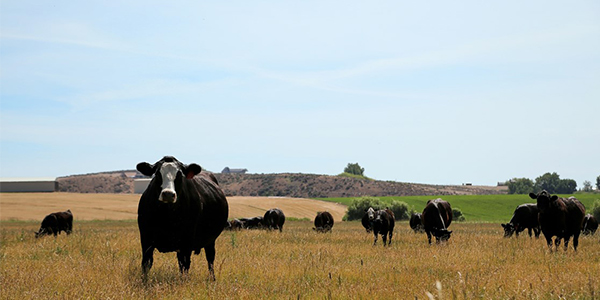Agricultural methane. Ruminant enteric methane.
What we’re talking about are cow farts — as well as cow burps. A hell of a lot. Silent, but deadly: a good chunk of the Earth’s greenhouse gases.
A U.S. representative from Washington state wants to attack them. Bill Gates thinks they’re a big deal.
And on Wednesday, a University of California, Davis study published in Plos One showed that that mixing red seaweed in cattle feed could decrease the amount of methane expelled from both ends of a steer by 80%. The study looked at this scenario with 21 Angus-Hereford beef steers.
It builds on a 2018 study by the same university that concluded seaweed mixed with feed reduced the methane in burps — measured four times a day — of 12 Holstein dairy cows.
UC Davis scientists have said cow burps produce the biggest chunk of methane, followed by cow farts, followed by emissions from cow manure.
Methane does not last as long in the atmosphere as carbon dioxide, but it’s 30 times as effective in trapping heat, which makes it a major greenhouse gas. In 2020, EPA calculated that agriculture produces 10% of the nation’s greenhouse gases.
Cow methane research could get a boost from a bill, the Research to Reduce Agricultural Methane Act, introduced last December by U.S. Rep. Kim Schrier (D-Wash). Her district stretches from Seattle’s outer suburbs to central Washington’s farmlands.
The bill’s language says, “Ruminants … four-legged mammals that possess stomachs with four compartments, such as cattle, buffaloes, sheep, produce methane through fermentation, their normal digestive processes and manure management and have the highest methane emissions per unit of body among all animal types. … Farming practices, including methods to reduce methane emissions, hold enormous potential to address climate change.”
A ruminant has at least one extra stomach that ferments plant matter and regurgitates it back into the mouth to be chewed as cud — further breaking down the grass, hay and feed to be swallowed again and digested.
Schrier’s bill calls for the Agriculture and Food Research Initiative, which issues research grants for the U.S. Department of Agriculture, to tackle more studies on this topic. The bill calls for studies to be conducted on feeds, additives such as seaweed and feeding practices. The bill also mentions other research fields such as changes in grain-to-forage ratios, the grinding and pelleting of feed, the use of enzymes, and creating new technologies to measure the effects of these experiments.
In December, Schrier said in a press release: “We are facing an unprecedented climate crisis, and it falls on all of us to find creative solutions to this pressing problem. Our farmers are the leading stewards of our land and on the front lines fighting climate change. While they are already innovating with solutions like no-till farming and increased cover crop adoption, we must provide more federal research support and ensure any game-changing products are accessible to our farmers and ranchers.”
Her bill is now in the Senate Agriculture Committee.
In a February discussion with the MIT Technology Review about his new book “How to Avoid a Climate Disaster,” Gates called for the U.S. and the Earth’s richest nations to set a goal of replacing 100% of their beef with plant-based or lab-grown meats. He doubted that this measure would be feasible in the world’s 80 poorest nations.
“I do think all rich countries should move to 100% synthetic beef,” Gates said. “You can get used to the taste difference, and the claim is they’re going to make it taste even better over time. Eventually, that green premium is modest enough that you can sort of change the [behavior of] people or use regulation to totally shift the demand.”



